Shelf Life
Natsume's Book of Faces
by Bamboo Dong,

Natsume's Book of Friends season 4 LE DVD+BD
Hanasaku Iroha set 2 LE DVD+BD
Rental Shelf
Inu Yasha the Movie: Complete Collection BD
Perishable
Nothing this week
Alright, welcome to Shelf Life.
 Everything good must come to an end eventually, but the ending of Hana-Saku Iroha is a little bit more bittersweet than most. After having two seasons to really get to know all of the workers at Kissuiso, and watching their daily lives as they unfold from dusk until dawn…suddenly when they're no longer there anymore, it feels empty. Not just the inn itself, but also suddenly the room you're sitting in. As much as I disliked some of the characters in Hana-Saku Iroha in the first season, by the time the second season trickled to a close, I realized they had become my friends, in the way that only fictional characters can be.
Everything good must come to an end eventually, but the ending of Hana-Saku Iroha is a little bit more bittersweet than most. After having two seasons to really get to know all of the workers at Kissuiso, and watching their daily lives as they unfold from dusk until dawn…suddenly when they're no longer there anymore, it feels empty. Not just the inn itself, but also suddenly the room you're sitting in. As much as I disliked some of the characters in Hana-Saku Iroha in the first season, by the time the second season trickled to a close, I realized they had become my friends, in the way that only fictional characters can be.While I liked the first season of Hana-Saku Iroha, I mostly definitely loved the second season. Ohana is a much more skilled attendant now, so the story is able to focus more on her and the lives of those around her, rather than inventing some new task of the episode that she needs to learn how to do. Seeing her work seamlessly with the others also allows for a new group dynamic—one in which they're all trying their hardest to work for a common goal, and one in which they behave much more like a family. A few times throughout the season, they're called upon to hunker down and try to plow through a large task, like planning for Enishi's wedding or the Bonbori Festival, and it's like watching a well-oiled team of professionals. You know they're just hospitality professionals—chefs, attendants, waitresses—but seeing them flex their skill and hardwork is not unlike watching sports movies where you know the Home Team is about to execute their special moves, or the Mighty Ducks are about to pull out the Flying V. (Or, in a more analogous example, like watching the guys and gals of Downton Abbey pull off the perfect dinner service.) The service industry may not be a glamorous one, but there's something breathless about the way these characters carry themselves.
This season also focuses a lot more on the dreams and ambitions of the characters as well, ranging from what they want to do with their futures, to their love lives. Within this context, Hana-Saku Iroha has one of the best “school culture festival” episodes I've ever seen. Ohana's class decides to host a princess café, and elect Minko to head the culinary committee. We get a chance to see a few things—not only has she grown remarkably as a chef, but we also see her childhood inspirations for becoming a chef, the way she treats this like a professional job, and the way she relishes the opportunity to create a dish for Tohru. Ohana shines in this episode as well with her typical well-rounded ingenuity and work ethic, and all around, it's a school festival episode that actually means something and advances the characters.
That's not to say that every aspect of the show gave me glee. Parts of the series made me roll my eyes a little…Ohana's chirpy determination to have an unrequited love for Ko seemed silly and extraneous, and although we are supposed to realize that she's a little on the naïve side, none of that is really resolved until the last few episodes. By then, it feels like this entire Ko teen romance subplot has been planted in just to have it there, even though it peaked creatively in the first season. Back then, it actually felt significant for Ohana to give him up in favor of focusing on her career training, but hey, people love their love stories.
Hana-Saku Iroha is really a delightful show, and P.A. Works does an incredible job with it. The characters are vibrant, which is absolutely critical for a slice-of-life show, and the trajectory that the story in this season is very heartwarming. I highly encourage fans to check it out.[TOP]
Looking for a change of pace, I popped in Viz Media's blu-ray Inu Yasha movie collection.
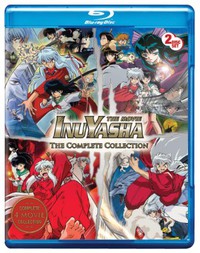 It's been almost a decade since I've actively really been excited about Inu Yasha. I'd forgotten what a jerk Inuyasha was (Kagome: “Did you try my omelet? It's my specialty!” Inuyasha: “Shut up already!” Jeez dude, calm down.), but hey, at least Kagome's a real sweetie. All four movies are now collected into a two-disc blu-ray release, and for those of you who've been waiting to collect all of these without having to sacrifice too much shelf space, this is the release. Although the first movie is a little grainy (it's still a little better than the DVD, though), the other three movies look vibrant and great.
It's been almost a decade since I've actively really been excited about Inu Yasha. I'd forgotten what a jerk Inuyasha was (Kagome: “Did you try my omelet? It's my specialty!” Inuyasha: “Shut up already!” Jeez dude, calm down.), but hey, at least Kagome's a real sweetie. All four movies are now collected into a two-disc blu-ray release, and for those of you who've been waiting to collect all of these without having to sacrifice too much shelf space, this is the release. Although the first movie is a little grainy (it's still a little better than the DVD, though), the other three movies look vibrant and great.That's good, because really, you could pop in just about any of the movies and it's preeeeeeeeetty much the same experience. The bad guy changes, and one of them has teen heartthrob Sesshoumaru, but they're all pretty much carbon copies of each other. Bad dude comes in, our heroes find out about it, they go slay some of his/her minions, but not before the main villain soups up and gets mega-powerful. But, teamwork prevails, and the Inuyasha/Kagome/(Sesshoumaru) dream team does their business, and all is saved.
Mind you, the formulaic-ness of the movies isn't exactly a bad thing. I certainly wouldn't recommend marathoning them—that's when the repetitive nature of the films becomes the most noticeable—but it's a formula that works, and does the good job of taking a really long show and distilling its essence into a reasonable run time. I wouldn't recommend the boxset for someone who's never seen the show before, but they're written in a way that if you really wanted to watch one of the movies one night, but are being forced to be social, you could totally invite over some newcomers, and I think they could figure things out enough to have a good time. Each movie starts off with a quick intro of all the characters (and that hilaaaaaaaaaaaaarious “Sit boy!” joke that made anime conventions a yelly/shouty mayhem in the mid-2000s), and away it goes.
Of all the movies, the first one is probably (subjectively) the best, which makes it slightly sad that it's the least vibrant and has the most artifacts of all four). It's unfettered by the restrictions of episode breaks, allowing it to tell the story at its own pace. The animation quality is only a slight step up from that of the TV series, but it gets a solid boost near the end, when all the action sequences take place. In it, Inuyasha is tasked with defeating the son of a demon who was previously sealed away by his own dad. The fights are pretty satisfying, and the movie itself has a good balance of violence and young teen friendliness, allowing some of the minions to meet their righteous ends in manners other than simply disappearing. The relationship between Kagome and Inuyasha gets an injection of heart, too, when Kagome comes to the realization that she could possibly be separated from him forever (HA! If only she knew she were in a heavily profitable franchise!). It lends a more melancholy tone to the movie, and it's a good chance of pace from the TV series.
The other three movies are… you know, they're fine. One of them pits the Inu-gome team against Naraku and the evil moon princess Kaguya. The third unleashes an evil SO HEINOUS that teenage fantasy bad boy Sesshoumaru has to help out his bro. And finally, we get a visit to a magic island where everyone has to fight some demons in order to free the half-demon kids that are being held captive there. This last one is the most far removed from the franchise, but I guess if you're really into cute demon kids, this one is pretty neat.
At only $29.99 MSRP though, now's the time to buy it, if you've been waffling on it. That's like $7 a movie, assuming you're even paying full retail for it, and the convenience of having all of the movies in one case makes it worthwhile for Inu Yasha fans. I don't know how often I'd ever want to watch all four of the movies, since they are pretty repetitive, but at this price point, it's at least not going to break the bank.[TOP]
Ending with another title from NIS America, I checked out the fourth and final season of Natsume's Book of Friends.
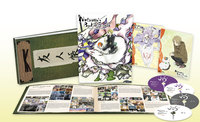 Although Natsume's Book of Friends ran for four seasons, it managed to keep things fresh and interesting in every single season. Considering how many "boy talks to yokai" shows there are out there, this is an impressive feat. Not only that, but there's really only so many yokai you can conjure up before you've collected all of them. You've got the ever-present Rokurokubi), the oni, and even the kedama-looking puff balls, which in Natsume's Book of Friends, is not only excruciatingly cute, but also can form a giant flying dragon with its other puff ball buddies. There are others too, but if you've seen enough yokai shows like I have, you've seen them all. Even so, this show excels in making them all different. They've all got different personalities, they all have vivid histories, they all have unique problems, and the best part is, the series isn't totally formulaic about the way they're presented. Sometimes one of their conflicts ends up stretching out over a few episodes, sometimes they just appear in the background. Some of them even play second fiddle to storylines that involve only Natsume.
Although Natsume's Book of Friends ran for four seasons, it managed to keep things fresh and interesting in every single season. Considering how many "boy talks to yokai" shows there are out there, this is an impressive feat. Not only that, but there's really only so many yokai you can conjure up before you've collected all of them. You've got the ever-present Rokurokubi), the oni, and even the kedama-looking puff balls, which in Natsume's Book of Friends, is not only excruciatingly cute, but also can form a giant flying dragon with its other puff ball buddies. There are others too, but if you've seen enough yokai shows like I have, you've seen them all. Even so, this show excels in making them all different. They've all got different personalities, they all have vivid histories, they all have unique problems, and the best part is, the series isn't totally formulaic about the way they're presented. Sometimes one of their conflicts ends up stretching out over a few episodes, sometimes they just appear in the background. Some of them even play second fiddle to storylines that involve only Natsume.Ultimately, this fourth season is all about him. It's about his relationship with the yokai, and it's about both the grief and the thanks that he's gotten from both sides regarding his activities. There are those yokai who question why he'd meddle in yokai affairs, and those who chide him for not being more careful. There are those who think that he should pick sides. Then there are those humans who think he's just plain nuts for seemingly talking to empty walls. Because of the latter, he's led a pained childhood, being passed around from relative to relative after his parents died (we see in the last set of episodes another childhood figure who's always despised him for his “weirdness”), but that's part of what makes his ties to yokai so compelling. He cares about them, even when they don't want him to. Maybe because he's never really had a family that he can remember, he feels even more bonded to his grandmother's book, and these yokai whom he's able to help. It's uplifting and sad at the same time, like watching a story about a boy with hundreds of friends, who's still lonely.
Of course, one thing always remains constant, and it's the delight that is Nyanko-sensei, in all his forms (but mostly his cat form, obviously). Somehow I never tire of seeing him or watching him lurk around the house, and I certainly never tire of hearing the wisecracks about him. At one point, one of the yokai pointed at him and asked, “what is that mochi-shaped thing?” and my heart swelled with love for that silly cat. Of all the sidekicks in the world, Nyanko-sensei sits at the vertex of cool, cute, and hilarious, and if ever there was to be a spinoff OVA that just involved him slinking all over town eating things, I'd buy it in a heartbeat.
It's the moments that don't directly involve the yokai that are some of the most powerful, though. In this season, we get a little bit of closure with Natsume and his parents, although the memories only come to him in bits and pieces. He gets a phone call from a childhood guardian that his old family house is about to be sold. Taking this opportunity to face his past, he looks at a photo of his parents at last, and steels himself to visit his childhood home. Somehow, even without him having any strong memories, it's still a painful scene. The snippets that he does see are pure and hopeful, but when he goes home to the Fujiwaras, there's finally a flicker of belonging.
“Natsume's Book of Friends” is undoubtedly the most fitting title the show could have possibly come up with. Sure, Natsume has human friends— they appear throughout the series, though they're never quite fleshed out as well as even the yokai who are there for an episode or so—but none of them pull the raw emotional punches like the yokai he's met throughout the series. Certainly none compare to Nyanko-sensei, who fills the role of best friend, confidante, protector, and family.
In the last episode, Natsume takes a family photo with the Fujiwaras. This ties in nicely with the previous episode, where we see him sobbing over a photo of his parents—something that he hadn't looked at in years, and was distraught in having almost lost. After the photo with the Fujiwaras is taken, he asks if they can take a picture with him and Nyanko-sensei. I'm not sure I could've asked for a better ending.[TOP]

Jacob from Canada sent in his shelves this week, and here's what he had to say about his collection:
"Greetings from Canada. I'm Jacob. This is my collection of anime and manga and all things related. While I've always been into anime, I only starting buying series seven years ago when I was fourteen, with the first series I ever bought being Azumanga Daioh. This isn't everything in my collection, there is another room where I store the majority of my video games and my Australian Pokémon DVD sets. This room is important though because it's become so cramped I had to get rid of my bed and replace it with a shiki futon to fit more shelves. I painted the mural based on one of the DVD covers from Haruhi Suzumiya."



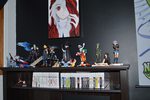

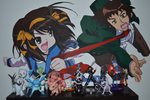

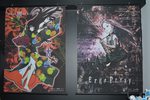

Those are some sweet recessed shelves!!! I am super jealous!
Want to show off your shelves? Send your jpgs to [email protected]. Thanks!
discuss this in the forum (31 posts) |
this article has been modified since it was originally posted; see change history